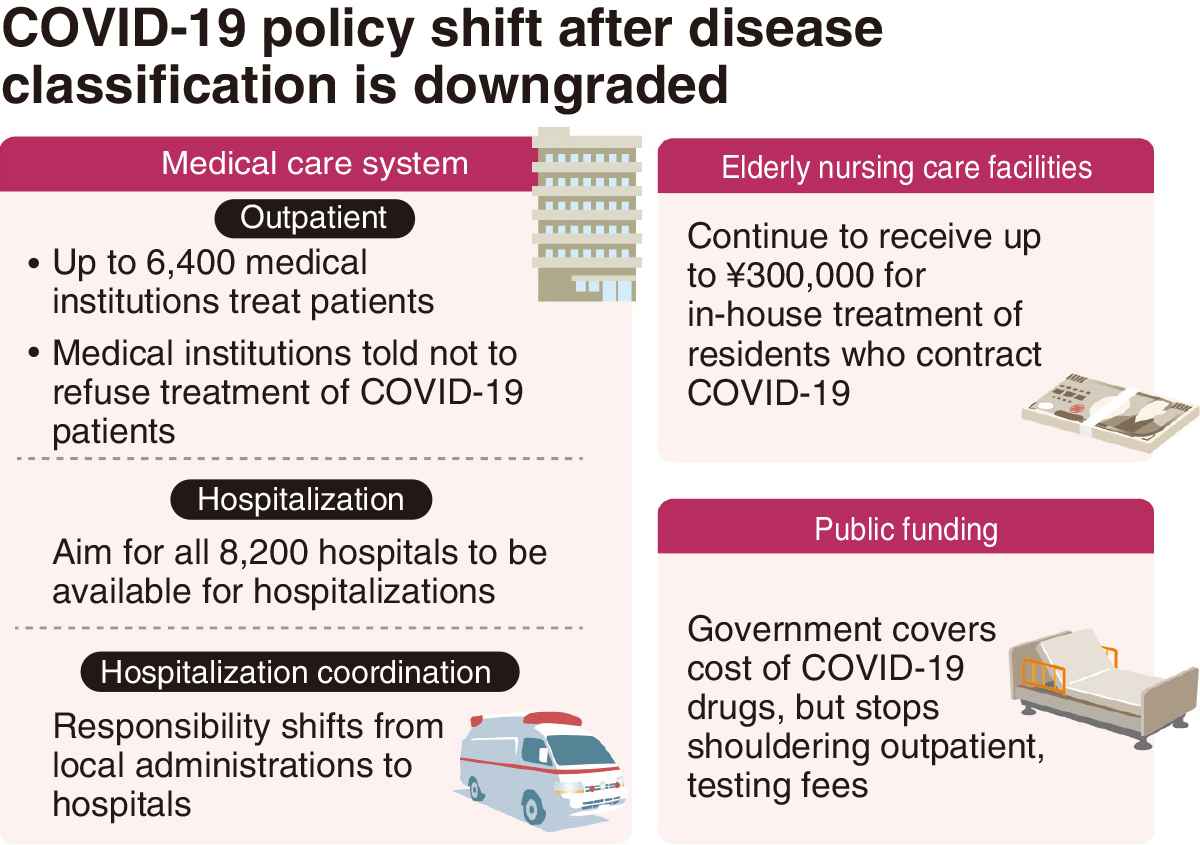
7:00 JST, March 4, 2023
The government aims to prevent hospitals from turning away COVID-19 patients when the disease is reclassified to the level of seasonal flu, according to a government draft outlining changes to the medical care system.
COVID-19 will be reclassified to Category V under the Infectious Diseases Law on May 8.
The government’s plan, which outlines measures to be implemented in stages through April 2024, will be decided next week at the earliest.
According to the draft, medical institutions will not be allowed to refuse to treat COVID-19 patients, and they will receive clear notification about the policy shift.
Medical practitioners cannot legally refuse a request for a medical examination or treatment “without legitimate grounds.”
However, as COVID-19 is currently classified as “equivalent to Category II” under the Infectious Diseases Law, medical institutions are not obliged to treat coronavirus patients, excluding certain facilities.
When the status is changed to Category V, the same level as influenza, there will be no “legitimate grounds” for medical institutions to refuse to treat COVID-19 patients. As a result, the number of facilities that accept coronavirus patients will increase.
The main part of the government’s plan comprises measures to get more medical institutions to treat COVID-19 patients, compared to the current situation in which only designated institutions do so.
For the plan to be effective, there will be a need for cooperation from medical institutions such as hospitals, which have repeatedly faced bed shortages amid the pandemic.
Under the revised policy, subsidies paid to hospitals that treat COVID-19 patients will be phased out. Instead, the government will offer subsidies to medical institutions that coordinate hospitalizations without the government’s involvement.
Also, the government will reduce subsidies currently paid to hospitals for reserving beds for COVID-19 patients and eventually stop securing such beds.
However, novel coronavirus is highly contagious and infections might surge again in the future, so cooperation among medical institutions will be needed to ensure severely ill patients can be hospitalized in the event of another outbreak.
The government wants prefectures to play a leading role in promoting cooperation among medical institutions.
By the end of next month, prefectures will formulate transition plans that will include provisions to promote the arrangement of hospitalizations among medical institutions, according to the policy draft.
Top Articles in Society
-

Man Infected with Measles Reportedly Dined at Restaurant in Tokyo Station
-

Man Infected with Measles May Have Come in Contact with Many People in Tokyo, Went to Store, Restaurant Around When Symptoms Emerged
-

Woman with Measles Visited Hospital in Tokyo Multiple Times Before Being Diagnosed with Disease
-

Australian Woman Dies After Mishap on Ski Lift in Nagano Prefecture
-

Foreign Snowboarder in Serious Condition After Hanging in Midair from Chairlift in Nagano Prefecture
JN ACCESS RANKING
-

Japan PM Takaichi’s Cabinet Resigns en Masse
-

Japan Institute to Use Domestic Commercial Optical Lattice Clock to Set Japan Standard Time
-

Israeli Ambassador to Japan Speaks about Japan’s Role in the Reconstruction of Gaza
-

Man Infected with Measles Reportedly Dined at Restaurant in Tokyo Station
-

Videos Plagiarized, Reposted with False Subtitles Claiming ‘Ryukyu Belongs to China’; Anti-China False Information Also Posted in Japan
























